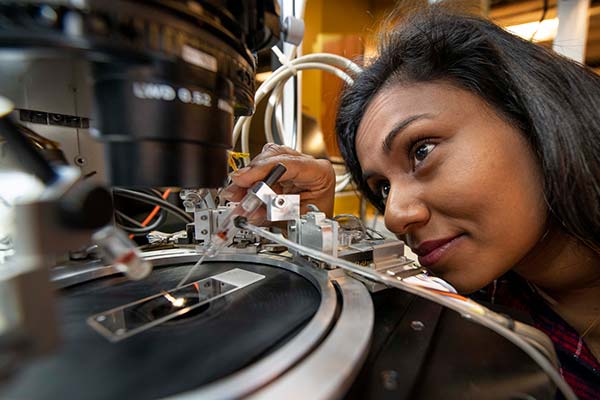|
|
|
|
|
|
 |
|
Impact of Innovation
This past year was a banner year for technology commercialization at UNT, but it’s only the beginning. Licensing revenues reached a record level in 2019, and faculty filed six times as many disclosures of inventions and intellectual property as they did in 2015. More importantly, the culture of innovation at UNT is changing. UNT researchers are looking at the work in their laboratories in new and creative ways, and technology created here is catching the eye of companies and potential investors.
|
|
|
|
|
|
|
|
 Shedding light on the past to better understand the present Shedding light on the past to better understand the present
In professors Andrew Torget and Todd Moye’s recent public history research seminar, their students uncovered important information about St. John’s, a disappeared freedmen’s community near Pilot Point, Texas that disbanded in the 1930s. Four of the students continued the research, discovering links between incidents of racial violence in Denton County and the dissolution of St. John’s. Micah Crittenden, now a graduate student in UNT’s department of history, used her research skills to help save a residence that was previously a one-room schoolhouse for African American students.
|
|
|
|
|
|
| TAMS students win with invention to help people with special needs |
|
UNT Texas Academy of Mathematics and Science students Rhythm Garg, Connie Wang, Wendy Rossi and Jeffrey Chen earned international praise for their 3D-printed device designed to help people with communication disorders interact with law enforcement. Their device, Intrapod, took home the top prize and a $1,000 grant in the fourth annual Inventor's Challenge, a competition put on by AT&T and Imagination.org. The team collaborated with UNT Police and the UNT Kristin Farmer Autism Center to help bring this idea to reality. Their work was featured by NBCDFW and the Denton Record-Chronicle.
|
|
|
|
|
|
|
| Great grads shoot for the stars |
|
UNT's Great Grads who are earning their degrees this December exemplify the creativity, innovation and integrity that the university strives to instill within all our students. With hands-on research experience alongside faculty mentors, these students are making an impact before they even graduate such as Rachel Werts, (pictured) a first-generation student who returned to UNT to earn a master's in mental health counseling despite the challenges she faced while earning her undergrad degree, and Morgan Kainu, an anthropology major, who began the UNT chapter of Students for the Exploration and Development of Space and founded the Society for Women in Space Exploration (SWISE).
|
|
|
|
|
|
|
| Fueling the future |
|
“Biofuels are the future, and lipids are the key,” says Kent Chapman, UNT Regents Professor and director of UNT's BioDiscovery Institute, who is currently working with researchers from the U.S. Department of Agriculture, the Agriculture Research Service in Maricopa, Arizona and the University of Guelph in Canada to find new ways of utilizing plant lipids to help the world and the people who live in it. Read on to learn why understanding the way plants store lipids could impact the future of everything from alfalfa crops to CO2 levels.
|
|
|
|
|
|
|
| Advancing archaeology millions of years |
|
UNT Geography and the Environment professor Reid Ferring is part of a team of 40 international researchers who developed a new method to identify the sex and species of animals in fossils more than a million years old. Having worked as a geologist and archeologist at a site in Dmanisi, in the country of Georgia for the last 27 summers, Ferring is especially well suited to his role in the new field of Palaeoproteomics, the study of ancient proteins. Read more about Ferring's experience and this new method being used to identify fossils.
|
|
|
|
|
|